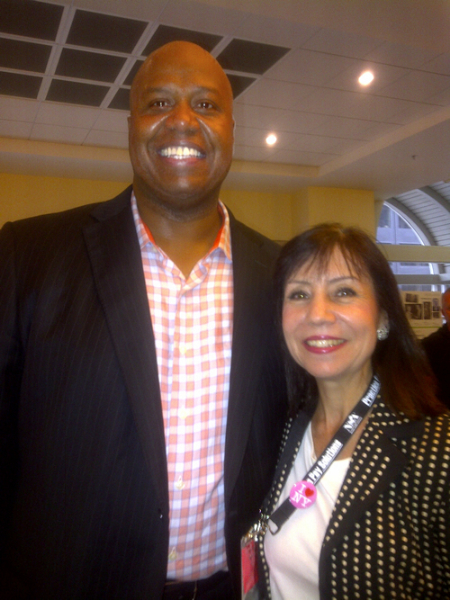Speaking Confidently and Effectively, a LinkedIn learning audio course by Pete Mockaitis and Diane DiResta made the Top 20 Most Popular Courses on LinkedIn. The course is hosted by Podcaster and Consultant, Pete Mockaitis and communications expert Diane DiResta, CSP, and author of Knockout Presentations.
Stage Presence: It's Not Just Public Speaking
Press release: Diane DiResta Delivers Keynote at the FEI Leadership Summit
Grand Floridian Resort
On May 19th, the FEI Leadership Summit kicked off in Orlando Florida. The opening evening reception opened at Epcot Center. The three day conference held at Disney’s Grand Floridian Resort, offered keynote speeches, break out sessions and events.
On May 20th, Diane DiResta delivered her keynote, Influential Leadership: Transforming High Stakes Communication into Massive ROI, to an audience of 500 FEI members. And the following day presented a one hour concurrent session entitled How to Give a Knockout Presentation.
Other keynote speakers included, Craig Kielburger-Making Doing Good, Doable, Roberto Masiero-A Better Way to Work, former NFL player Anthony Trucks -Trust Your Hustle and artist Erik Wahl-The Art of Leadership.
The Financial Executive of the Year award was bestowed on winners from public, private and non-profit organizations.
About FEI
The 2019 Financial Leadership Summit offers professional and personal development, including networking opportunities in a knowledge-intense and enjoyable atmosphere. It’s an opportunity to join the conversation and interact within a prestigious community of like-minded peers to challenge thinking and share in challenges while strategizing for tomorrow.
About Diane DiResta
Diane DiResta, CSP, is Founder and CEO of DiResta Communications, Inc., a New York City consultancy serving business leaders who deliver high stakes presentations— whether one-to-one, in front of a crowd or from an electronic platform. DiResta is the author of Knockout Presentations: How to Deliver Your Message with Power, Punch, and Pizzazz, an Amazon.com category best-seller and has spoken on 4 continents.
Diane is Past President of the NYC chapter of National Speakers Association and former media trainer for the NBA and WNBA. She was featured on CNN, and quoted in the NY Times, Wall Street Journal, London Guardian, and Investors Business Daily and Bloomberg radio.
Diane is a Certified Speaking Professional, a designation held by less than 12% of speakers nationwide. And her blog, Knockout Presentations, made the Top 50 Public Speaking blogs.
Optimize Your Speaking Business Through International Bookings.
If you’re a professional speaker and wondered what it would be like to speak internationally, take heed from A-Speakers Bureau. The leaders of the speaker’s bureau gave a presentation in New York City to a group of professional members from National Speakers Association New York City Chapter. Soren, the presenter, warned us that there are two concerns European companies have regarding working with Americans: contracts and travel.
We were advised to keep our speaker contracts short and no longer than four pages. In some countries, professional speakers are hired through email and a verbal agreement. U.S. speakers need to explain all the legalese and special clauses because it scares off European companies from hiring them. In countries like Denmark, there are no contracts for fees under $10,000.
While speaking in Europe sounds glamorous, the reality is the fees are lower. The highest speaking fees are paid in the U.S. The U.S. also has a large association market which is not the case in Europe where the public sector (hospitals, schools, ministries) account for 70% of the bookings. In Denmark, 88% of bookings are for the public sector. France has a low demand for speakers. Germany values educational titles and credentials. Professors and PhDs should fare well.
The average speaker fee in Denmark is $2000-$2500. In Norway or Sweden, speakers would profit a little better at $3000-$3500 per keynote speech. In the UK, be aware that there’s a tradition of free speakers. They meet and speak in clubs. In Germany it’s possible to command fees of $5000-$15,000. In the UK, decisions are made from the top down. The CEO approves everything. Denmark has a flat structure which streamlines the process. In the U.S. it may take 22 days to select a speaker. The same decision can take only four days in Denmark.
Europeans are also concerned about travel costs and are afraid they’ll be billed for first class travel. It was recommended that speakers quote one flat fee that includes the speaking fee and travel cost. Go online and estimate the travel expenses and use a currency converter.
When it comes to content, American keynote speakers planning to speak in Europe must guard against their own assumptions. Soren shared a growing trend in Northwest Europe that is the antithesis of the U.S. positive self- improvement movement. A popular psychology professor tells audiences it’s okay to say no to self-development and to want to be rooted in tradition. This trend started around 2008 during the financial crisis.
Overall, there is a demand for U.S. speakers. Europeans want inspiration but don’t worry if you’re not rocking the room. Europeans are not as responsive as U.S. audiences. And they don’t get excited by “free stuff’. In the past, the most desirable speakers were heavy on entertainment with less focus on information. Today the trend is shifting. While entertainment and inspiration are important there’s an increasing demand for stronger content. The most successful keynoters will create a change in the audience that they can go home and implement.
Speaking in Europe can be an exciting adventure to learn about other cultures and spread your message to an International audience. Do your homework and adjust your expectations and you’ll expand your speaking business beyond borders.
7 Ways to Build Trust on the Platform
Public Speaking Success Secret: Stay in Your Lane
National Speakers Association Winter Conference Sees the Future
Losing Your Train-of-Thought
Press Release: Diane DiResta Earns the Certified Speaking Professional® Designation
National Speakers Association Gets a New Name.
I just returned from the NSA National convention, Perform 2014. It was amazing as always. But this year was different from any other. It was decided that we needed to rebrand to keep up with the changes in the speaking industry. So NSA has a brand new name! Welcome to Platform. Professional speaking is no longer just about giving a keynote from the stage. Speakers show up on many platforms: the main stage, small group seminars, webinars, podcasts, youtube videos, TV interviews, live streaming, and other forms of content. It's all about content on as many platforms as possible.
What do you think of the new name? Is it time for you to rebrand? Watch this video by branding expert Bruce Turkell to learn more. I'd love to hear your comments.
It's Risky to Play It Safe Even With Public Speaking
"The title seems so opposite to your sweet, demure image..."
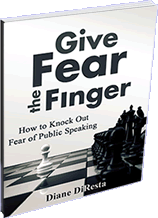 This was the email from someone in my networking group after reading the title of my new ebook, Give Fear the Finger: How to Knock Out Fear of Public Speaking. Of course, the title is so NOT me. There was a moment when I considered changing it. It's edgy and has a real New York energy. That's probably why so many of my New York City friends loved the title. But what about others? I took a risk and the feedback is overwhelmingly positive. People from all over love the title!
This was the email from someone in my networking group after reading the title of my new ebook, Give Fear the Finger: How to Knock Out Fear of Public Speaking. Of course, the title is so NOT me. There was a moment when I considered changing it. It's edgy and has a real New York energy. That's probably why so many of my New York City friends loved the title. But what about others? I took a risk and the feedback is overwhelmingly positive. People from all over love the title!
It made me realize that playing it safe can cause us to stagnate even as public speakers. How many of you are giving the same tired speech? What are the risks you're afraid of taking? When you're introduced, do you hand over a boring bio or do you write your own ingenious introduction?
Do you default to being in control as the speaker or do you let go and engage the audience? It can be risky to open up a dialogue but the rich conversational nuggets can have a rewarding outcome.
Are you sentenced to speak to internal company groups or are you ready to take your show on the road?
What about your delivery? Are you wedded to your script or do you engage in repartee with the listeners? Are you willing to wade into the unknown waters of spontaneous humor and playing in the moment?
Does PowerPoint lead you by the nose or can you tell the story without a slide?
Finally, are you concerned about being perfect or can you risk being real? Telling your story can be one of the scariest experiences for a speaker. But here's the truth: People are swayed by emotion. They relate to people who are like them. They trust people who are honest enough to be vulnerable.
So if you're playing it safe and doing what you've always done, you're on shaky ground.
It's risky to play it safe. Even as a public speaker.
Tell me about the risks you've seen speakers take and how it impacted the audience.
Public Speaking Success: What Seed Are You?
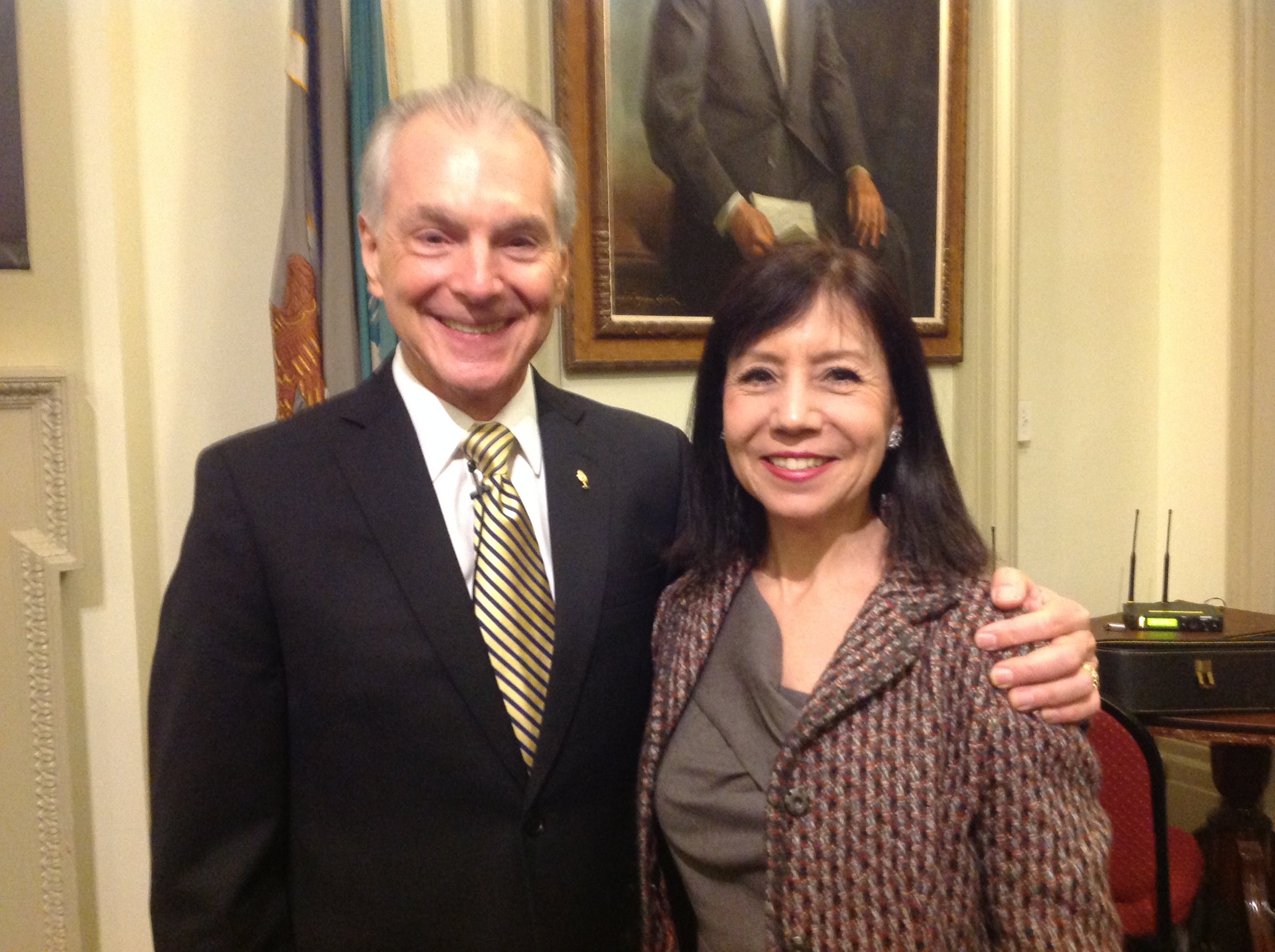 Jim Cathcart, motivational speaker and author of the Acorn Principle, spoke to the NYC chapter of National Speakers Association today. As a former president of the National Speakers Association and a Hall of Fame Speaker, Jim shared his time line and journey of success to the heights of professional speaking. His insights and advice for success applied to speakers and non-speakers alike.
Holding up an acorn, he asked the audience "What seed are you?" Jim explained that the stem represents your legacy, the cap holds on to the seed to help it grow (your support system, coaches, mentors) and the seed is the potential that lives within you.
Jim Cathcart, motivational speaker and author of the Acorn Principle, spoke to the NYC chapter of National Speakers Association today. As a former president of the National Speakers Association and a Hall of Fame Speaker, Jim shared his time line and journey of success to the heights of professional speaking. His insights and advice for success applied to speakers and non-speakers alike.
Holding up an acorn, he asked the audience "What seed are you?" Jim explained that the stem represents your legacy, the cap holds on to the seed to help it grow (your support system, coaches, mentors) and the seed is the potential that lives within you.
The keys to success according to Jim are:
- Know yourself
- Accept yourself
- Improve yourself
He advised speakers to "nurture your nature." In other words, be true to your style as a public speaker. He contrasted the over-the-top expressive motivational speaker, Zig Ziglar with the reserved, business content speaker, Brian Tracy. Both were wildly successful because they were authentically true to their natural speaking styles.
The psychologist and professional speaker, Tony Allesandra, author of The Platinum Rule, had difficulty starting out as a speaker. A coach diagnosed the problem and told him to stop trying to be Jim Cathcart. Jim is a Southern gentleman and Tony is an "in your face" guy from the streets of Brooklyn. When Tony accepted himself, he found his own voice and his career soared.
Jim encouraged the audience to discover themselves and how they operate. He challenged the group to make a commitment to take the first step and the rest will come. Whether you want to be a professional speaker or raise the bar on your presentation skills, decide what you want and be a fanatic about it. According to Jim, "Success is unreasonable. Ordinary is reasonable." If you study your topic for one hour a day, within five years you'll be an expert. We all have seeds of greatness waiting to be expressed.
So, what seed are you?
Don't Let What Happened to Michael Bay Happen To You
What's a public speaker's worst nightmare? It's what happened to Michael Bay. Going blank and not knowing what to do can cause any speaker to freeze with fear. I saw this happen during the December holidays at a networking party. The event took place in a large store with a winding staircase in the middle of the room. Each speaker climbed a few stairs and then talked to 50 women who were standing around. The third speaker ascended the stairs and began to talk about hair care. He started out fine. But a few minutes into it he said, "I'm sorry " and left the building. We didn't know what hit us.The audience didn't see that coming. But something happened inside to trigger a panic attack. Michael Bey was interrupted by the emcee, lost his place on the teleprompter and couldn't recover. He walked off. It was a painful moment for him, the emcee, the sponsor, and the viewers. What could he have done? What would you do?
http://www.youtube.com/watch?v=XlC-VIX9Gyg
The best preparation aside from rehearsing is to know your worst case scenario and plan a recovery strategy.
Have a Backup Script-If you ever speak from a teleprompter, have a back-up script. Although not ideal, Michael could have taken the script and continued the presentation.
Play it Again Sam-If the technology goes down or the teleprompter malfunctions, call it out and ask them to restart. I once saw a Miss Universe pageant. The contestant began her presentation in English and then got flustered. Instead of dying on the platform, she announced that she was going to continue in French. The audience encouraged her with applause.
Stop and Breathe-Public speaking success is not guaranteed. If you experience brain freeze, take a moment to focus on your breath. This will help you come back and regain your composure. People walk off in a panic because they don't know what to do. Too many public speakers fear silence. So they exit the stage. You don't have to act immediately. Pause and breathe to come back into your body.
Fire an Anchor-This takes preparation. Create a physical anchor, or word that will trigger you back into confidence. Fire it and expect to experience a state of excellence where you have that "can do" attitude. You can give fear the finger.
Let Go and Go with the Flow-When disaster strikes, take a lesson from martial arts. Don't fight against the energy. Use it. Disarm your opponent. In this case, the opponent is fear.
The best public speakers are prepared and then let go. Nobody is better at this than Bill Clinton. During one of his presidential speeches he realized that somebody put the wrong speech in the teleprompter. He was able to wing it until Hillary could notify the person responsible. .If you're wedded to every word you will have a difficult time as a public speaker.
When Michael's speech was out of sync with the teleprompter, the emcee asked him a question about the slides.That was the opportunity to let go of the script and to have a conversation.The presentation could have morphed into an interview and Mr. Bay could have remained on stage.
The Lesson? In the arena of public speaking, it's not always what you say, it's how you recover. If at all possible, avoid using a teleprompter. Be prepared and know this too,will pass.
What was your worst public speaking moment? What did you do?
10 Presentation Trends for 2014
In 2014 presentation skills will reign supreme. Leaders and entrepreneurs will need to be more visible across different media platforms. Speaking is the new competitive advantage and the bar has been raised. Here are the trends in presentations that I predict for 2014.
- Broadcasting skills - Whether you're an entrepreneur or employed by a company, expect to have your 15 minutes of fame.Today's presenters need broadcasting skills. Media training will become a vital success skill even for those who do not speak to the press. I'm currently coaching a client to lead quarterly webcasts. Five years ago this senior executive wasn't doing any broadcasting. This client has since been filmed for executive promotional videos. Video presentations will increase in popularity. I use eyejot.com to send quick video emails. Videos can be very effective or very detrimental if you have weak presentation skills.
- Mobile presentations - Mobil technology is exploding and the number of apps is growing. This will require adjustments in the way we communicate. Slide shows and websites must be adjusted for mobile devices.The key word in presentations is portability. On a personal note, I now videotape my coaching clients on the ipad. The quality is as good as a video camera and it's easier to transport.
- Increased Need for Speaker Training - The need for excellent presentation skills will increase.due to the competitive nature of the market. Products and services can quickly become commodities and in order to be persuasive, presenters will need to know how to capture and hold the ear of the listeners.
- Self marketing presentations - Personal branding will become even more important. In a crowded market place where good jobs are at a premium. Job candidates will have to master marketing and selling. That means understanding what makes them unique and how to position themselves, their message, and their value with clarity and impact. Lack of confidence will be the deal breaker. Speakmarketing will be a growing factor for small business success. Presently, I'm coaching small businesses to develop webinars to grow their businesses.
- Storytelling - Telling stories will no longer be the domain for the talented few. Leaders will be challenged to learn the art of storytelling to develop trust, express their vision and to lead their teams. And storytelling skills will be the differentiater in the job interview.Certain companies such as Pepsico, have a culture of storytelling. The best interviewers will invest in public speaking coaching to learn to tell their story instead of presenting their resume.
- Authenticity - Audiences are more sophisticated and less tolerant than ever. They want to know who the speaker is as a person.Do they walk their talk? Audiences will value presenters who are real versus a just-the-facts approach. I was asked to coach somebody who had a well-crafted PowerPoint deck but delivered it like a talking head. Listeners are thinking "Who are you?"
- Increased Audience Interaction - The key word is connection. In a society where there is less time for socializing and more stress, people want to have an experience and participate with the speaker. Watch for increased live polling, tweeting, live streaming,and audience participation. Technology will level the playing field as speakers can now use inexpensive polling software on their mobile devices.There will also be an increase in virtual presentations. I'm coaching more clients remotely due to technology tools.
- Less Fluff More Value - Motivational speakers will always be popular as long as the human soul craves uplifting messages. But today's presenters need more than a string of 'feel good" stories. They must be able to provide value, tips, strategies, action steps, a different way of thinking along with those stories. Audiences are more demanding.
- Shorter Keynote Speeches - The 18 minute TED-like talk will become more commonplace. This is already happening at conferences. Instead of the one to three hour breakout sessions, event planners and audiences are opting for a series of shorter talks.
- Continuity - The old transactional model of giving a one hour presentation and then return to business as usual, will give way to the idea of continuity.The message will continue after the event or meeting with additional contact and add-on resources. Despite the fact that younger audiences are leaving facebook, social media will continue to be an important communication channel for staying connected. However, people will consider the return on their time and become more focused and narrow in their social media communication.
All of these trends can be summarized in one idea: Public speaking is more important than ever. The need for excellent presentation skills is not going away. It will only increase in 2014 and beyond. Just as with technology upgrades,presenters will upgrade their public speaking skills or risk becoming obsolete.
From Good to Great to Awesome Presentations
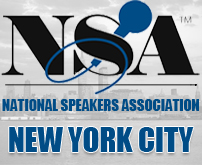 How do public speakers go from good to great to awesome? They attend the NYC chapter of the National Speakers Association. The guest speaker for November was executive speech coach, Patricia Fripp. The speaker covered five areas every professional speaker must master in order to be great on the platform:
How do public speakers go from good to great to awesome? They attend the NYC chapter of the National Speakers Association. The guest speaker for November was executive speech coach, Patricia Fripp. The speaker covered five areas every professional speaker must master in order to be great on the platform:
- Strong Structure - Fripp shared the importance of knowing your premise and telling the audience the why and how of your message.
- Compelling Openings - The audience received a page with one liners such as "It never ceases to amaze me...", " The year was... ", "What would the world be like without...?"
- Emotional Connection - To create an emotional opening start with something emotional or heartfelt and back it up with logical reasons.
- Memorable Stories - Stories are powerful and can be any length as long as the audience remains engaged.
- Laser Sharp Specificity - Generalities weaken a presentation. Words like "stuff" dilute the message and confuse the listeners. Remove empty words and use specific language.
After the morning lecture, Fripp spent the afternoon doing quick laser coaching with volunteers. Each speaker spoke no more than two or three lines before the coaching began. It was evident how a powerful opening sets the stage for the rest of the presentation.
To go from good to great to awesome public speaking, remember the five tips: strong structure, compelling openings, emotional connection, memorable stories, and laser sharp specificity.
For the Record... Professional Speaking Is a Business
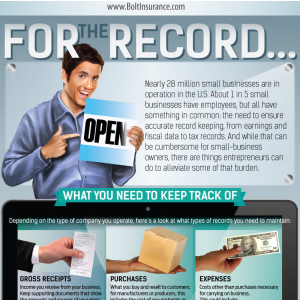 This infographic came across my desk, and I thought it was a good reminder for small businesses, including speakers, coaches, and consultants. We spend time working IN our business at the expense of working ON our business.
Professional speaking is a business. Getting and staying on the speaking platform doesn't happen magically - it takes good business skills.
This infographic came across my desk, and I thought it was a good reminder for small businesses, including speakers, coaches, and consultants. We spend time working IN our business at the expense of working ON our business.
Professional speaking is a business. Getting and staying on the speaking platform doesn't happen magically - it takes good business skills.
One of your greatest business assets is time, and time is finite. Be strategic about any pro bono speaking engagements you accept. Be sure you're in front of your target market, and follow up on qualified leads. Keep receipts for your travel, meals, and material costs. According to this infographic, shoddy record keeping is one of the biggest mistakes small businesses make.
Many businesses fail within the first five years. Take a look at some of these small business mistakes. This is good timing. September is the time to take a second look at your goals and get ready for the next year.
Via: BOLT Insurance
Six R's of Public Speaking and Presentation Success
 September is back to school month. Students first learn the three R's- "Reading, (w)Riting, and 'Rithmetic." But for public speakers and presenters there are actually six R's.
Last weekend I attended a workshop on videomarketing - Share the Sizzle. One of the speakers, Mary Agnes Antonopoulos, talked about the six R's for succeeding in social media. I realized that those same six characteristics apply to successful public speaking and presentations. The six R's are Relevance, Recognition, Rapport, Relationships, ROI, and Responsibility.
September is back to school month. Students first learn the three R's- "Reading, (w)Riting, and 'Rithmetic." But for public speakers and presenters there are actually six R's.
Last weekend I attended a workshop on videomarketing - Share the Sizzle. One of the speakers, Mary Agnes Antonopoulos, talked about the six R's for succeeding in social media. I realized that those same six characteristics apply to successful public speaking and presentations. The six R's are Relevance, Recognition, Rapport, Relationships, ROI, and Responsibility.
Relevance - One reason presentations fail is lack of relevance. I see this all the time in my coaching practice. Too many presenters are speaker-centered and not listener-centered. They talk about what's important to them, instead of addressing the self-interest of the audience. Public speakers may have a relevant topic but if they don't present examples, case studies, or stories that are meaningful to the listeners, the ideas can die a quick death. For example: when pitching an idea to senior management, don't spend time on details. That's irrelevant to them even though details are very relevant to end users. Speak to the interests of the audience for maximum relevance.
Recognition - People do business with people they know, like, and trust. The first step is visibility. Do people know who you are? If not, it will take longer to gain their trust and to sell your ideas. I knew an executive whose department contributed significantly to the company's revenues; however, most people weren't aware of this executive's accomplishments. As a result, the executive did not advance as quickly as expected. The better the audience knows you, the more easily they'll accept your information and ideas. That's why companies hire celebrities to sell their product. Seize opportunities to speak and promote yourself to increase your recognition.
Rapport - Rapport has to do do with likability. How likable are you as a presenter? Do you exude warmth? Or are you a talking head? I've noticed some commonalities between speakers who fail to achieve audience rapport.
First, they don't smile. If you're too serious, you may come across as distant and even intimidating. The public speaking myth is that "serious" means "professional." Actually, the reverse is true. The top leaders and public speakers smile and use humor. When you're relaxed, you appear more confident.
The second mistake I've observed is rushing. When speakers get right down to business and talk AT the audience instead of with them, the audience retreats emotionally. That's why many speakers begin with opening remarks and humor. They share something personal about themselves or the audience. When I was in Tanzania, I memorized my opening remarks. I said, "Good morning. I'm happy to be here!" in Kiswahili. To my surprise, they audience broke out in applause. I was literally speaking their language!
The third reason for failed rapport is that presenters don't pace the audience. They hold on rigidly to their outline or PowerPoint. Successful public speakers are able to let go of the script and move where the audience wants to go. Don't let rigidity be one of your six R's.
Relationships - If rapport is about likability, then relationships are about trust. Once the audience likes you, it means they're engaged at the moment and willing to listen. You may be entertaining but until the audience trusts you, they won't take action.
Let's say you're giving a marketing talk. You have excellent platform skills. You're entertaining. But at the end of the presentation, nobody buys your product. Assuming you're in front of the right people, audience skepticism may mean they don't know you well enough.
The top speakers build a relationship with the audience and that happens before they ever meet. It starts with an email which may be followed up with a postcard or phone call. These public speakers provide third party testimonials and leverage mutual relationships.
In company meetings, you'll have better success in gaining support if you meet people for lunch, stop by their desks to say hello, and get to know them. Chase Manhattan Bank had a slogan that said it best: "The right relationship is everything."
ROI - We often think of ROI as Return on Investment. For presenters, it also means Return on Impact. If you're selling a product or pitching for funding, success can be measured in dollars. Most of the time, presenters are communicating information or selling an idea internally. These presenters won't see increased dollars in their pockets if their idea is accepted. But they will experience return on impact because they'll increase their influence within the organization.
How do you know if you've made impact with an informational presentation? The listeners will be engaged. They'll ask questions. You'll see nodding heads and direct eye contact. Positive feedback will filter through the company grapevine.
Responsibility - Public speakers and presenters have a responsibility and some take it lightly. You have a responsibility first and foremost to deliver what you promise. When a store advertises a sale and then pulls a Bait and Switch act, you automatically feel frustrated, angry and distrustful. Many consumers will walk out of the store.
I've seen speakers do the same thing. I once heard a celebrity speaker announce, "I don't think I'll talk about... [the subject that was published in the schedule]. We can cover that in the second session. What I want to talk about is..." The problem with that decision was that I didn't sign up for the second session and that celebrity speaker lost credibility. I'll read his books, but I won't attend a live presentation again.
Presenters have an obligation to their listeners. There's a contract between a public speaker and an audience. Even if you're giving a meeting update, be sure to honor the time commitment and give them the information in a way they can understand. When you speak to a large audience, be sure to deliver the presentation they signed up to hear.
Professional Speaking: How to Work with Speakers Bureaus
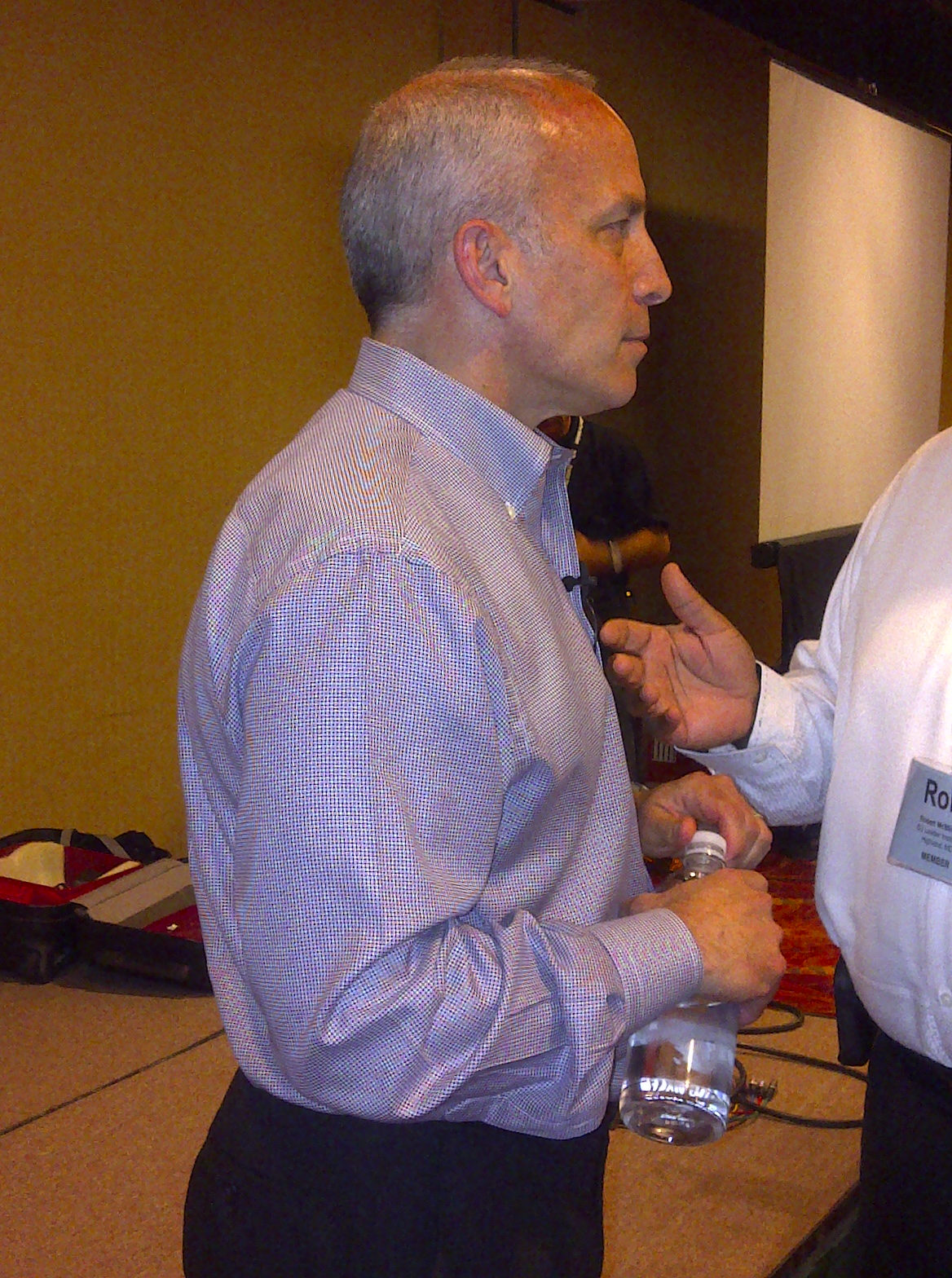 The dream of most professional speakers is to be represented by a speaker bureau or lecture agent. Unfortunately, professional speaking is like the acting industry. You can't get an agent until you're known. Bureaus have more than enough speakers. What they want most is more clients who will hire their speakers.But, if you have a unique and compelling message and a track record of excellence they may take a chance on you.
The dream of most professional speakers is to be represented by a speaker bureau or lecture agent. Unfortunately, professional speaking is like the acting industry. You can't get an agent until you're known. Bureaus have more than enough speakers. What they want most is more clients who will hire their speakers.But, if you have a unique and compelling message and a track record of excellence they may take a chance on you.
What is a speakers bureau? It's a middle man, or broker, for speakers and entertainers. They market to corporations and associations and match them with the perfect speaker for their event. They take an average 25-30% commission from the speaker's fee. The bureau or agent owns the client and any spinoff business.
Brian Palmer. President of the National Speakers Bureau in Libertyville Illinois, recently spoke at the NSA convention. He shared with us what buyers have told him about working with speakers. These are the mistakes they see, which he passed on to us. Here are a few of the highlights from his talk:
1. Pricing.
a.) Scrutinize your price and get it right. b.) Have a written policy under which conditions you'll alter your fee. c.) Measure the gap between your fee and what you actually book each month.
When you say you won't lower your fee, the average response from the buyer is "I had to ask that question." Brian tells his clients if they want the speaker to lower the fee, they must put the offer in writing. "Make me an offer". It changes the equation.
2. Too many topics.
Have no more than three topics with great titles and descriptions. You can test topics, but don't list a bunch of topics. Customers care how you dress, how you speak, how you listen, table manners, interacting with the audience, your behavior. Be extra polite. It matters what happens off the platform. Companies want you to be aspirational.
3. Missed or ineffective pre-conference calls.
Brian calls these "hurdle raisers". Most of the time the conference calls are missed by the speaker. Don't do it. Prepare for the call and don't use a cell phone. The number one issue is talking too much when being briefed. It's important to be excellent on those calls. Be lively. Brian lost his client because the speaker was a "zero" on the phone.
4. Lack of personalization.
Companies bring you in to achieve some business end. Build your business around helping them achieve their goals. They don't hire you to hear what you have to say.
5. Selling too much.
Asking three times on the phone if they want to buy books is a bad sign. Don't go over their heads. He cited Joe Calloway as someone who gets hired over and over again. Joe gets brought in for consulting after his speeches. Don't ask before you go on stage if you can mention your book. When you pitch, it takes away from your message. And, Brian cautions, "Don't add people to your mailing list unless they ask for it".
6. Image.
How you answer the phone, your responsiveness, impacts whether a bureau wants to represent you. Show up, be on time, be prepared.
7. A presentation that does not include both head and heart.
Phyllis Diller analyzed her laughs. Motivational speaker, Walter Bond, aims for less than a minute between big laughs. Every two or three minutes there should be a laugh. It could be a nodding moment, but there must be an emotional connection!
8. Poor quality demo videos. A speaker demo video should be longer rather than shorter. A three minute video scares people. Include audience shots and enough footage so the client can see a flow. Customers want an excellent speech.
The goal is to have a great video of a great speech. Brian mentioned Amanda Gore's 2004 preview speech as being one of the best. It was 20 minutes long and there was a thunderous ovation at the end.
9. Not being authentic.
People want to hire smart people that happen to speak. It's not good to have a website that's filled with speaker poses. Your website should not look like a speaker site.
While there may be many opinions about how to work with speakers bureaus, Brian gave the audience some good food for thought and valuable tips for developing a good relationship with speakers bureaus.
How to Be a Professional Speaker
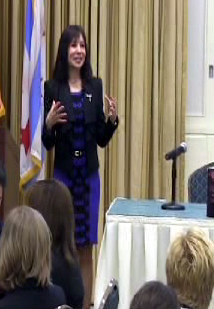 August 7th is Professional Speaking Day. Do you want to be a professional speaker?
I've been a professional speaker and executive speech coach for a long time. Aspiring speakers ask me all the time how they can become professional speakers. So in honor of Professional Speaking Day, here are some tips about the exciting, rewarding, and very challenging business of professional speaking.
August 7th is Professional Speaking Day. Do you want to be a professional speaker?
I've been a professional speaker and executive speech coach for a long time. Aspiring speakers ask me all the time how they can become professional speakers. So in honor of Professional Speaking Day, here are some tips about the exciting, rewarding, and very challenging business of professional speaking.
1. Professional speaking is a business. People fall in love with the glamor of being on stage before a live audience. But the truth is this. Delivering a one hour keynote or workshop is a fraction of the time that's required to make that speech happen. First and foremost, professional speakers are in the sales and marketing business. You're not a professional until someone pays you. Treat speaking as a business.
2. Professional speakers provide value. You must have a compelling story to tell or content that improves people's lives and careers. It takes time to research current trends and develop content that is relevant to your audience. Who is your market? Who will pay to hear you speak? What do they want and need to hear? What kind of return will they receive for their investment in you?
3. Professional speakers are experts. What is your expertise? Paid speakers have credentials and experience that give them credibility to speak on a selected topic.Unless you're a celebrity or reality star, you won't be hired unless you have a track record of success..That's why you don't see that many young people in the professional speaking business. A jack-of-all trades or someone who speaks on a wide array of topics will not be taken seriously.
4. Professional speakers are paid. Yes, we all do pro bono speeches for charity and for marketing to our target audience. But professionals earn their living from speaking and also maintain fee integrity. That means they have set fees for their services.
5. Professional speakers have multiple streams of income. In these challenging economic times, it's the rare speaker who earns 100% of his/her income from keynote speeches. Most professionals speakers have add-on services such as, workshops, facilitation, boot camps, consulting, coaching, off-site retreats, books and products.
6. Professional speakers are members of the National Speakers Association. I've been a member of NSA since 1991. Not all speakers are members, but if you're serious about the profession of speaking you need to get to a meeting. Join your local chapter. I'm a member of the New York chapter. NSA will change the way you think. Many speakers also belong to toastmasters. What's the difference? Toastmasters is for anyone who wants to improve their platform skills. NSA is for professional speakers who want to learn the business of speaking.
7. Professional speakers have a coach. Why? Because speakers continually need to raise the bar. Even the top speakers use a coach to fine tune their message and platform skills. If you're just starting out and can't afford a coach, find a mentor. Watch TED talks and youtube videos. Go to live events and conferences and take note of how the best speakers own the room.





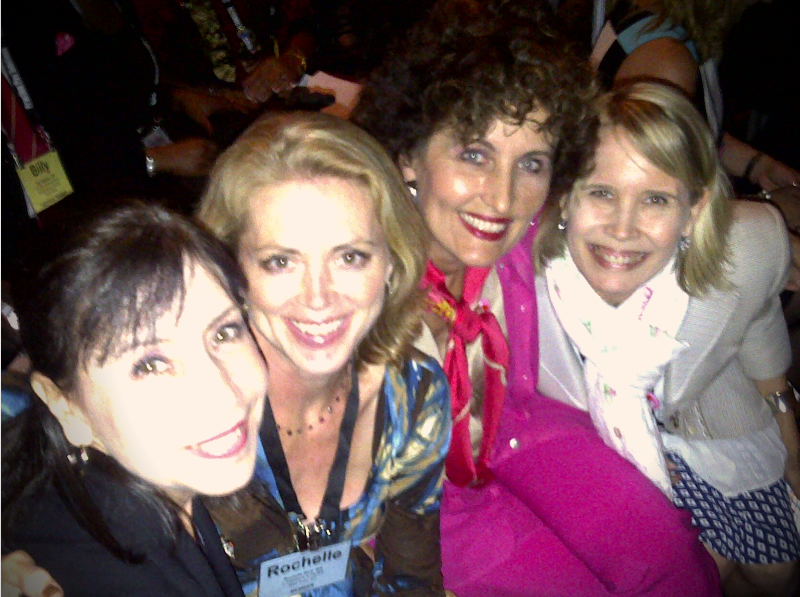 Does your audience still hear your voice after your presentation?
This was one of the provocative questions asked at the 2013 National Speakers Association convention. The event was held in Philadelphia, the City of Brotherly Love. And I was loving this event! I came back excited and with new ideas to share with you.
Does your audience still hear your voice after your presentation?
This was one of the provocative questions asked at the 2013 National Speakers Association convention. The event was held in Philadelphia, the City of Brotherly Love. And I was loving this event! I came back excited and with new ideas to share with you.